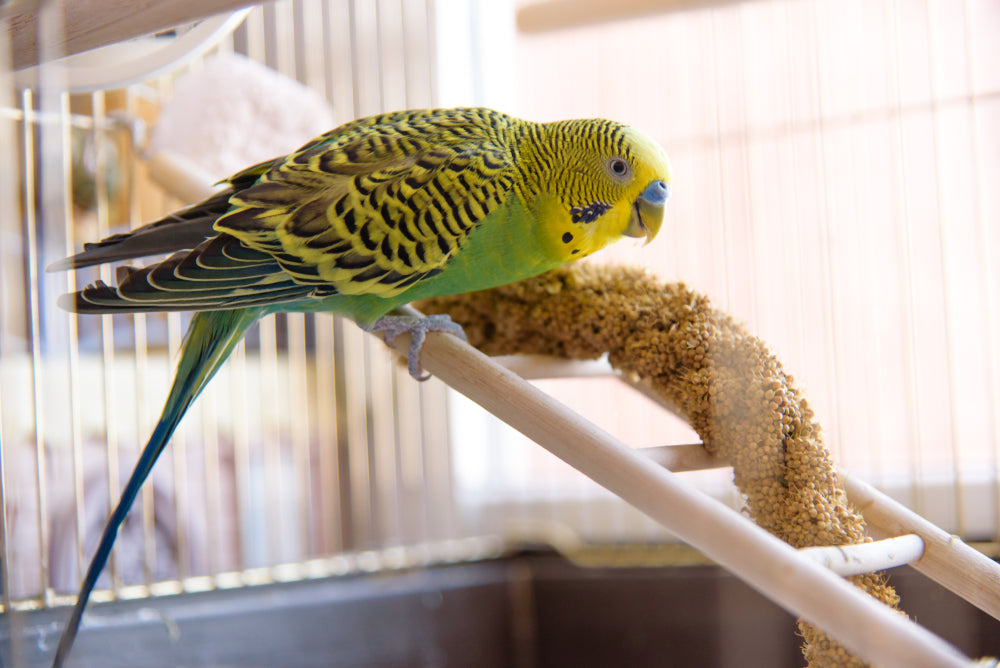
5 Reasons Why Your Parakeet is Shaking
Parakeets are delightful birds and adorable pets. Naturally, we want to take the very best care of them. But it's not always easy to determine what a particular bird behavior means or what your parakeet may be intentionally or involuntarily communicating. Shaking or trembling is a common parakeet behavior that can mean many different things. It can even occur simply because your parakeet is preening. If you find yourself asking, “Why is my parakeet shaking?" consider these five possible reasons for your parakeet's behavior.

1. Your parakeet may be nervous.
Parakeets are prey animals, which means that in the wild, they might be chased and hunted by other animals or birds. As a result, parakeets are attuned to their environment, and they may react (or overreact!) negatively to unusual or sudden changes in the environment. A sudden loud noise like thunder? A scary new sight like a cat? Things like this might be enough to upset your nervous parakeet, causing a bit of trembling or shaking. If the nervousness was caused by something like an unusual noise, the shaking will likely subside on its own after a while. If something else in the environment (like a change in the room's appearance) upsets your parakeet, you might need to adjust the room or consider moving your pet's cage to alleviate his fears.
2. Your parakeet could be cold.
If you get overly chilled, you might start shivering. It turns out your parakeet is no different. As a warm-blooded creature, her body might start shivering to generate heat, giving the appearance that she's shaking.
You definitely don't want your parakeet to be too cold. As a tropical bird species, parakeets thrive best in temperatures around 70-75°F. While they can tolerate temperatures a bit out of this range, they don't handle the cold like chickens, and you may find your average household temperature is a bit lower than your parakeet's ideal room temp. To help keep your parakeet feeling nice and cozy, consider adding a heated bird perch to her cage. A bird warmer — something like the K&H Snuggle Up Bird Warmer can also provide your parakeet with a cozy way to get warm whenever she needs to.
3. Your parakeet could be hot.
Perhaps your parakeet is sitting on his bird cage perch, and you notice a shaking motion, throat fluttering or even some light wing flapping. Is it a warm day? If it is, your parakeet may shake if he's too hot. In this case, it's not caused by involuntary shivering like when he's cold. Instead, it's a deliberate attempt to get some air moving and cool himself off. If the thermometer moves into the mid-80s or 90s, your parakeet can be at risk of heatstroke and might display other behaviors — like yawning or panting — besides the shaking. So, it's important to keep your bird in an environment with a comfortable temperature range.
4. Your parakeet could be thinking about flying.
Some parakeet owners routinely clip their bird's wing feathers to prevent flying and avoid dangerous situations like a bird flying out an open door or into a ceiling fan. But some parakeet owners carefully train their birds for flights in a safe environment. If your bird is thinking about taking a flight, she could display pre-flight shaking actions.
5. Your parakeet could be ill.
While you wouldn't want to jump to a false conclusion, your parakeet could shake from an illness or injury if you've already ruled out other options. This is especially true if the abnormal shaking is tied to other symptoms like puffy eyes, general lethargy, failure to preen regularly, etc.
One tricky aspect for parakeet owners is that birds generally tend to be a little evasive about illness. Even though parakeets are considered domesticated, they've still only been bred by humans for less than 200 years (as opposed to dogs and cats, whose domestication goes back thousands). As a result, your parakeet may try to hide his feelings or symptoms, so daily observation is critical. You want to know what “normal" looks like for your particular pet. If you suspect your parakeet shakes because he's sick, contact your bird's veterinarian.
Parakeets Can Use Body Language to Communicate
Your parakeet can communicate with you in lots of ways, and shaking or trembling is one obvious way for her to convey basic information. Narrowing down the cause of the shaking allows you to take the necessary steps to alleviate the issue and help ensure your bird is happy and healthy for years to come.


Leave a comment